ENGLEWOOD, Colo. — In 1984, Mike Shanahan arrived in Denver far from the heights he'd someday reach. Within two decades, he'd lead the Broncos to their first Super Bowl victories and be known around the league as the architect of the league's best offenses.
Long before that, on Jan. 24, 1984, Shanahan resigned from an offensive coordinator position with the University of Florida to join the Broncos, starting out as the team's wide receivers coach. Despite that title, close observers could tell Shanahan was destined to make an impact far beyond just his purview as a position coach — even if his youth belied his wealth of knowledge.
"He's the guy who's going to come in and provide the jumper cables for the worn-down Denver offense that has trouble getting started even in warm weather — whatever that is," Denver Post columnist Shelby Strother wrote the following day. "Shanahan is 31 years old and has eight years of coaching experience and because he's been successful everywhere he's coached, he is called a Boy Wonder."
With that reputation, Shanahan entered the NFL perhaps thinking that he knew quite a lot about the game. He was quickly disabused of that notion shortly after joining the staff when he had the chance to sit down with the Broncos' longtime defensive coordinator, Joe Collier.
"When I come in, the first time I get in the National Football League, I get a chance to sit down and talk to Joe Collier," Shanahan recalls. "He's actually been a head coach in the league in the '60s, he's been a coordinator for the Broncos — and I realized talking to him how much I have no idea about football."
At that time, Collier's pro football coaching experience stretched back nearly 25 years — he had been coaching in the AFL or NFL for the entire duration of the Broncos' existence. A legend in the game, Collier had molded Denver's defense to become one of the most fearsome units of the '70s, famously known as the "Orange Crush."
"He was doing things with defenses back in the mid-'70s implementing the 3-4 defense [when other teams weren't]," Shanahan says. "Colleges were doing it, but the pros weren't doing it. He was doing things where he was utilizing his players. … You look back on the people that really influence you, and Joe Collier was the first guy in pro football that influenced me in a big way."
Throughout that first year in the NFL, Shanahan made note of how Collier operated, and in the decades that followed, the impact on the Ring of Fame coach, the Broncos and the NFL would be immeasurable.
"When you're around a guy like that and you watch the way he prepares and the way he handles himself and the way he prepares himself in big games," Shanahan says, "I said, 'Hey, if I get a chance — hopefully I can be like him someday.'"
Just over a decade later, Mike Shanahan's evolution was entering its final stage.
Named Denver's head coach in 1995, he may have lost the "Boy" part of the Boy Wonder label at 42 years old, but he continued to impress.
In the 11 years since first joining the Broncos, Shanahan rose quickly to become head coach of the Raiders for a brief two-year stint from 1988-89, returned to Denver to be quarterbacks coach and offensive coordinator for three seasons and then landed with the 49ers in 1992 as an offensive coordinator under Bill Walsh. During that time, Shanahan continued to learn, and by the time he returned to Denver, he had the knowledge of exactly what he wanted to do and how he wanted to do it.
Having been around John Elway for several of his finest years, including his 1987 MVP season, Shanahan had a foundational level of trust with his star quarterback that allowed him to put his strategy into motion. His plan focused on building a balanced offense that maybe took the ball out of Elway's hands more to rely on a powerful running attack while still giving him all the same potential for game-breaking passing plays.
"You've got to keep defenses honest," Shanahan says. "You get one-dimensional on any defense and they will figure it out. There's a lot of smart people that are out there, and if they know what you're going to do, I promise you they will make adjustments. You have to keep people off balance and you have to keep people honest and you've got to have a lot of people playing extremely hard and playing hard."
Despite an 8-8 season to begin his tenure as head coach in Denver, Shanahan and the Broncos offense found their footing quickly. The team ranked third in total offense and ninth in scoring offense in 1995, then jumped to first in total offense and fourth in scoring offense the following year as Denver posted a 13-3 record.
Over the next two seasons, as Denver won back-to-back Super Bowls, the Broncos became nothing short of an offensive goliath. The '97 team's offense ranked No. 1 in scoring offense and total offense, second in rushing yards per attempt and fourth in passing efficiency. The next year's group was second in scoring offense and third in total offense with a dominant rushing attack led by 1998 league MVP Terrell Davis, who became the fourth rusher in NFL history to run for more than 2,000 yards.
"One thing with a great running game is you know it takes a whole defense to stop it, if you know how to run the football," Shanahan says. "And then with the flexibility of having different formations, different shifts, different motions, you can really capitalize on a defense when they think a run's coming, when you suck people up, if it's linebackers or safeties, to have a chance to come up with a big play. So, you always want to keep a defense honest, just like a defense wants to keep an offense honest."
Even after Denver's Hall of Fame quarterback retired following Super Bowl XXXIII, the Broncos' offenses under Shanahan were extremely effective. During the 10 seasons that followed before Shanahan and the team parted ways, Denver ranked in the top half of the league in rushing yards, with five seasons in the league's top five. No team ran for more yards during that span, and the Broncos ranked second in rushing yardage per carry. Denver's passing attack also was dangerous, and it ranked third in yardage during that span.

Simply put, Shanahan's tenure in Denver as head coach is unparalleled.
The Super Bowls speak for themselves, as do the overall regular-season and postseason win totals, which rank tops in franchise history.
But Shanahan's reach was felt far beyond just the walls at team headquarters, particularly because of the offense that he led. During his 14 seasons from 1995-2008, the Broncos totaled more than 81,000 yards; the closest franchise was more than 2,000 yards behind Shanahan's Broncos teams.
So while Shanahan hasn't coached in the NFL for nearly a decade, his influence is widespread across the league today as teams hope to emulate that level of success and the style of offense that proved so effective.
His disciples stretch across the league now. Sean McVay, head coach of the Rams, was an offensive assistant and position coach under Shanahan in Washington; Matt LaFleur, head coach of the Packers, was Shanahan's quarterbacks coach in Washington during that same span from 2010-13; Kyle Shanahan, Mike's son, is head coach of the 49ers and spent four years on his father's staff during that Washington stint; former Broncos running back Anthony Lynn worked with Shanahan for three seasons as an assistant coach and later became head coach of the Chargers before taking his current position as offensive coordinator of the Lions in 2021.
And, of course, there's Gary Kubiak, who later followed in Shanahan's footsteps as a Super Bowl-winning head coach in Denver. The former quarterback played for Shanahan and later became an apprentice under him as his offensive coordinator and quarterbacks coach before becoming a head coach with Houston and then Denver.
"His contributions are immense," Broncos Head Coach Vic Fangio says. "There's plenty of guys that coach in this league — both as head coaches and assistant coaches — that somehow came through Mike. Obviously with his son, Sean McVay, LaFleur in Green Bay and others. Mike's system that he evolved to over the years — when Mike was the coordinator with the Niners, that's not actually the system he became really famous for. He incorporated some of that with what he thought. That's what these guys are running now. Mike has had a great impact on the game and was a great head coach."
Shanahan shrugs off legacy talk, but the truth of that is beyond his control at this point. The West Coast offense he developed for his Broncos teams affects the way the game is played today
"I think your legacy is kind of like everything you've done throughout your life, the process of being part of it," Shanahan says. "That's one thing about the journey: If you're in coaching, the journey is never easy, but you have to fight through it. You're going to have the highest highs and the lowest lows, and tough times don't last — tough people do. If you've got that type of mindset, then good things will happen to you."
Good things happened to Shanahan, and great things happened to the Broncos. The team's first Super Bowl victories, of course, are a large part of that, but so is the standard of success that's followed the team and the expectations that have made Denver a destination for players, coaches and staff members hoping to find success of their own.
For many of the people that came before him in Denver, success at a championship level eluded them, but as Shanahan recognizes, that doesn't make them any less important than him to the team's history. Without them — and perhaps especially Joe Collier — it's entirely possible that Shanahan would not have been the kind of coach he became.
"I'll be honest with you: It's truly a process," Shanahan says. "Me, but how about all these guys from 1960 to 1973 — how long it took to have that first winning season — and then all the success they had before the Super Bowl. You take a look at '75 and '76, those defensive teams. And then the Super Bowl, even though we came up a game short playing those Cowboys, we set a standard to get there. And then it took us a while to win it. But everybody was part of that process."
After being elected to the Broncos Ring of Fame in 2020, Shanahan will soon finally be enshrined. His pillar on the Ring of Fame plaza and his name on the façade at Empower Field at Mile High will be unveiled, and at long last, Mike Shanahan's place in Broncos history will be cemented.
Look back through the coaching career of the Broncos' all-time winningest coach — new Ring of Famer Mike Shanahan.

Coach Mike Shanahan of the Denver Broncos in 1990. (AP Photo / Al Messerschmidt)

Owner Pat Bowlen and coach Mike Shanahan at the Paul D. Bowlen Memorial Broncos Centre.

Coach Mike Shanahan signs autographs for fans at 1995 training camp.

A portrait of Mike Shanahan in 1995

Denver Broncos head coach Mike Shanahan talks to quarterback John Elway during the first quarter against the Buffalo Bills in Denver Sunday night, Sept. 3, 1995. (AP Photo/Ed Andrieski)

Oakland Raiders vs. Denver Broncos at Oakland Alameda County Coliseum Sunday, December 24, 1995. The Broncos beat the Raiders 31-28. Denver Broncos quarterback John Elway (7) shakes hands with head coach Mike Shanahan. (AP Photo/Al Golub)

Coach Mike Shanahan rides in a cart at the June 9, 1997 Mike Shanahan Golf Classic.

John Denver and Mike Shanahan during the Special Olympics Dinner on April 26, 1997 in Denver, Colorado. Photo by Michael Martin

Mike Shanahan during the Special Olympics Dinner on April 26, 1997 in Denver, Colorado. Photo by Michael Martin

Mike Shanahan, with Gary Kubiak behind him, checks the play clock during a game against the New England Patriots at Mile High Stadium in Denver, CO on October 6, 1997.

Mike Shanahan looks up to the big screen to watch an instant replay against the Kansas City Chiefs at Arrowhead Stadium in Kansas City, MO on November 16, 1997.

John Elway talks with Mike Shanahan on the sideline during a game against the Seattle Seahawks at the Kingdome in Seattle, WA on September 7, 1997.

Coach Mike Shanahan of the Denver Broncos talks with coach Pete Carroll of the New England Patriots in August 1997. (AP Photo / Al Messerschmidt)

Owner Pat Bowlen and coach Mike Shanahan look on during an August 4, 1997 preseason game against the Miami Dolphins in Mexico City.

Denver Broncos head coach Mike Shanahan, Hall of Fame quarterback John Elway (7) and offensive coordinator Gary Kubiak watch from the during an NFL game against the Carolina Panthers on November 9,1997. The Broncos defeated the Panthers 34-0. (Peter Read Miller via AP)

John Elway and Mike Shanahan discuss strategy in the locker room after a game against the San Diego Chargers at Jack Murphy Stadium in San Diego, CA on November 30, 1997.

Head Coach Mike Shanahan yells directions during the AFC Championship game against the Pittsburgh Steelers at Three Rivers Stadium in Pittsburgh, PA on January 11, 1998.

Head coach Mike Shanahan speaks with his players in the locker room after defeating the Jacksonville Jaguars at Mile High Stadium in Denver, CO on December 27, 1997.

Head Coach Mike Shanahan addresses the team in the locker room after the Broncos won their divisional round playoff game against the Kansas City Chiefs at Arrowhead Stadium in Kansas City, MO on January 4, 1998.

Denver Broncos linebacker Bill Romanowski douses coach Mike Shanahan after beating the Pittsburgh Steelers 24-21 to win the AFC Championship Sunday, Jan. 11, 1998, at Three Rivers Stadium in Pittsburgh. (AP Photo/Doug Mills)

Owner Pat Bowlen and Head Coach Mike Shanahan pose with the AFC Championship trophy after the Broncos' victory against the Pittsburgh Steelers at Three Rivers Stadium in Pittsburgh, PA on January 11, 1998.

Mike Shanahan holds up the AFC Championship trophy and says, "This is not the one we want," after the Broncos beat the Pittsburgh Steelers at Three Rivers Stadium in Pittsburgh, PA on January 11, 1998.
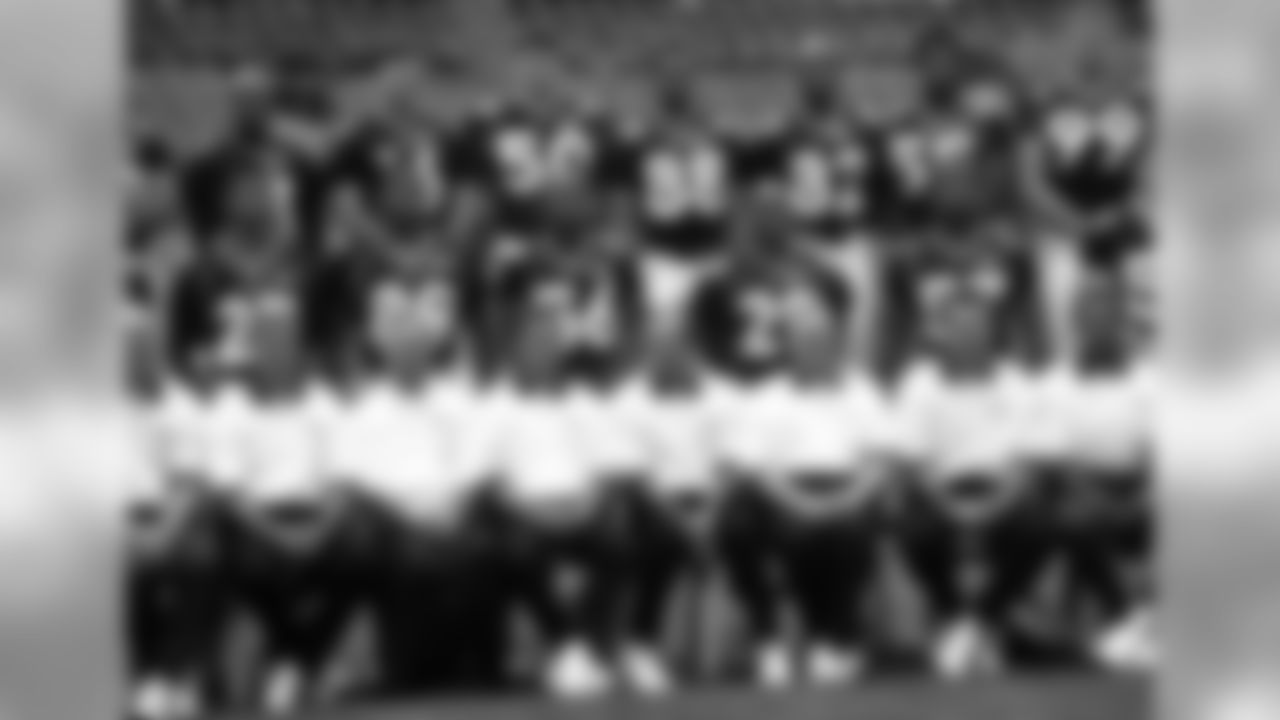
Coach Mike Shanahan of the Denver Broncos poses with players and staff on photo day at Super Bowl XXXII January 20, 1998 in San Diego, California. (AP Photo / Al Messerschmidt)

Head Coach Mike Shanahan shakes the hand of Shannon Sharpe during pregame warmups before Super Bowl XXXII against the Green Bay Packers on January 25, 1998.
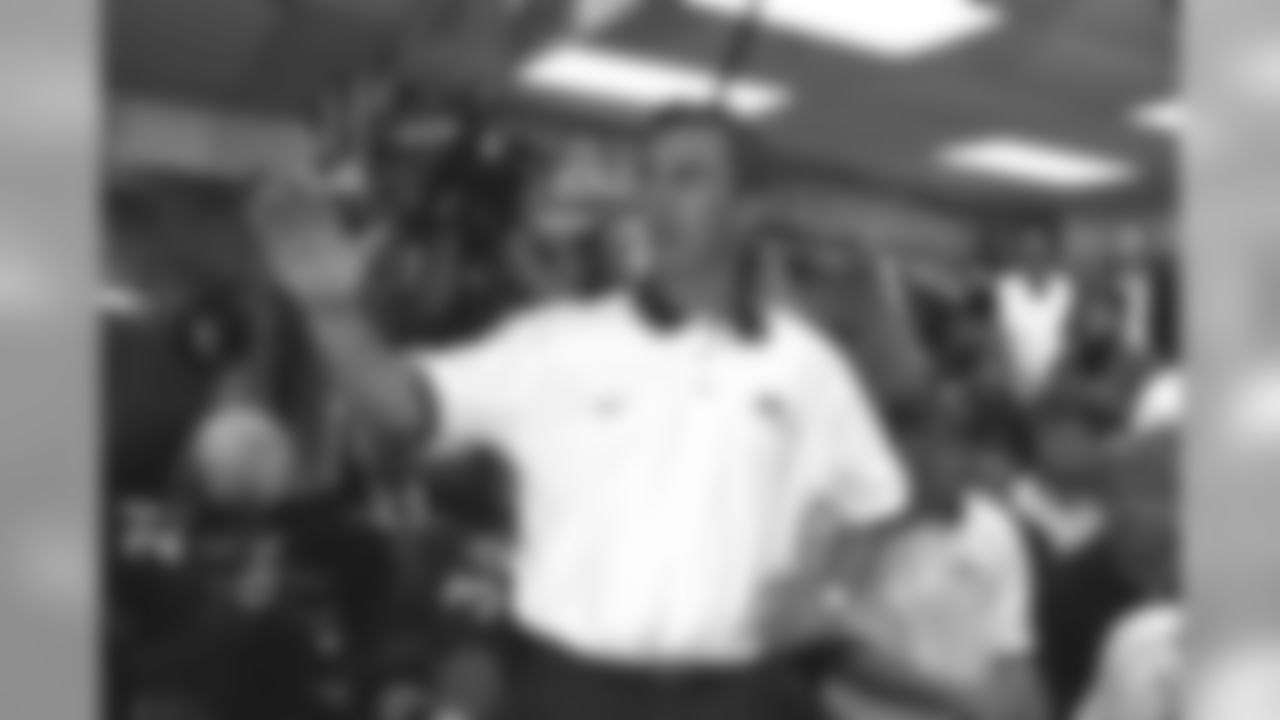
Mike Shanahan addresses his team in the locker room during his post-game speech after winning Super Bowl XXXII against the Green Bay Packers at Qualcomm Stadium in San Diego, CA on January 25, 1998.

Head Coach Mike Shanahan takes the Vince Lombardi Trophy from owner Pat Bowlen in the locker room during post-game celebrations after winning Super Bowl XXXII against the Green Bay Packers at Qualcomm Stadium in San Diego, CA on January 25, 1998.

John Elway receives post-game congratulations in the locker room from coach Mike Shanahan after winning Super Bowl XXXII against the Green Bay Packers at Qualcomm Stadium in San Diego, CA on January 25, 1998.

Mike Shanahan waves to the crowd of fans during the team's Super Bowl XXXII championship parade.

Head coach Mike Shanahan during the championship parade rally, the day after returning from the Super Bowl.

Mike Shanahan speaks to the crowd during the Super Bowl XXXII championship parade and rally.

Pat Bowlen and Mike Shanahan poses for a photo with the Lombardi Trophy.

Mike Shanahan watches the action from the sidelines against the San Diego Chargers at Mile High Stadium in Denver, CO on November 8, 1998.

Head coach Mike Shanahan congratulates his quarterback John Elway during a game against the New England Patriots at Mile High Stadium in Denver, CO on September 7, 1998.

Mike Shanahan gives a game ball to John Elway after the Broncos won their first playoff game against the Miami Dolphins at Mile High Stadium in Denver, CO on January 9, 1999.
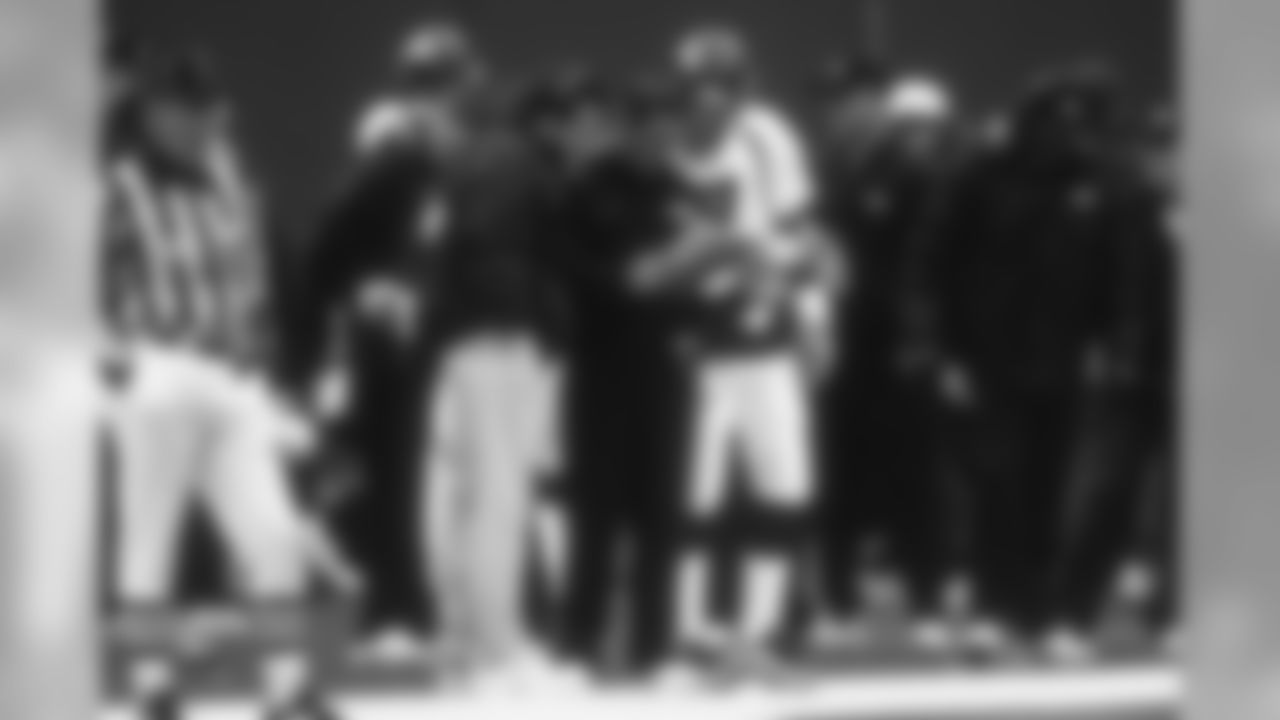
Mike Shanahan, Gary Kubiak and John Elway discuss strategy along the sidelines during a game against the New York Giants at Giants Stadium in East Rutherford, NJ on December 13, 1998.

Mike Shanahan gives a postgame speech after a Broncos win against the Cincinnati Bengals at Cinergy Field in Cincinnati, OH on November 1, 1998.

Mike Shanahan gets a victory hug from Keith Burns after winning Super Bowl III against the Atlanta Falcons at Pro Player Stadium in Miami, FL on January 31, 1999.

Denver Broncos coach Mike Shanahan and the sideline react to a scoring play during the Broncos' 34-19 victory over the Atlanta Falcons in Super Bowl XXXIII on January 31, 1999 at Pro Player Stadium in Miami, Florida. (AP Photo / Al Messerschmidt)

John Elway gets a hug from Mike Shanahan after winning Super Bowl III against the Atlanta Falcons at Pro Player Stadium in Miami, FL on January 31, 1999.

Denver Broncos head coach Mike Shanahan, right, and Atlanta Falcons head coach Dan Reeves, left, meet at midfield at the end of Super Bowl XXXIII, in Miami Sunday Jan. 31, 1999. The two had worked together on the Broncos' coaching staff in the '80s. (AP Photo/John Gaps III)

Mike Shanahan receives the Lombardi Trophy from Terry Bradshaw after winning Super Bowl III against the Atlanta Falcons at Pro Player Stadium in Miami, FL on January 31, 1999.

John Elway and Mike Shanahan celebrate their second straight Super Bowl title after defeating the Atlanta Falcons at Pro Player Stadium in Miami, FL on January 31, 1999.

Mike Shanahan addresses his players following the Broncos' Super Bowl XXXIII victory against the Atlanta Falcons at Pro Player Stadium in Miami, FL on January 31, 1999.

Denver Broncos quarterback John Elway, left, joins head coach Mike Shanahan at a news conference Monday, Feb. 1, 1999, in a downtown Miami hotel in holding the Super Bowl MVP trophy that Elway earned with his performance in leading the Broncos to their second straight title by winning Super Bowl XXXIII over the Atlanta Falcons. (AP Photo/David Zalubowski)

An estimated 350,000 fans turned out in downtown Denver and then on to city hall to catch a glimpse of their back-to-back world champion Broncos. Mike Shanahan gets a chant started of "one more year, one more year ..."

Mike Shanahan and Jack Elway watch the players participate in the Broncos' minicamp held at the Broncos' training facility in Englewood, CO.

Mike Shanahan and Terrell Davis talk before the start of their season opener against the St. Louis Rams against the St. Louis Rams at Trans World Dome in St. Louis, MO on September 4, 2000.

Mike Shanahan heads into the locker room prior to the start of the game against the San Francisco 49ers at Mile High Stadium in Denver, CO on December 23, 2000.

Mike Shanahan and Brian Griese talk before the start of their season opener against the St. Louis Rams against the St. Louis Rams at Trans World Dome in St. Louis, MO on September 4, 2000.

Mike Shanahan shakes hands with Raiders head coach Jon Gruden after the game against the Oakland Raiders at Network Associates Coliseum on September 17, 2000.

Mike Shanahan watches the action from the sidelines against the San Diego Chargers at Qualcomm Stadium in San Diego, CA on October 8, 2000.

Mike Shanahan addresses his players following the Broncos' victory over the Falcons against the Atlanta Falcons at Mile High Stadium in Denver, CO on September 10, 2000.

Mike Shanahan addresses his players following the Broncos' victory against the San Francisco 49ers at Mile High Stadium in Denver, CO on December 23, 2000.

Mike Shanahan speaks to the media at the Broncos' training camp held in Greeley, CO.

Mike Shanahan gives his postgame speech following the Broncos' victory against the New Orleans Saints at Invesco Field at Mile High in Denver, CO on August 25, 2001.

Mike Shanahan chats with Bill Belichick following the game against the New England Patriots at Invesco Field at Mile High in Denver, CO on October 28, 2001.

Following the 2002 NFL Draft, second-round pick Clinton Portis sits down to talk with Mike Shanahan.

Various players, coaches, alumni and local celebrities came out the Inverness Golf Course in Englewood, CO. to take part in the annual Mike Shanahan Golf Classic.

Mike Shanahan chats with Terrell Davis along the sidelines against the San Francisco 49ers at INVESCO Field at Mile High in Denver, CO on August 19, 2002.

Steve Atwater greets Mike Shanahan along the sidelines against the St. Louis Rams at Invesco Field at Mile High in Denver, CO on September 8, 2002.

Mike Shanahan gives instructions to Jason Elam during a game against the Buffalo Bills at Invesco Field at Mile High in Denver, CO on September 22, 2002.

Mike Shanahan gives his players a hug in the final seconds of the game against the Kansas City Chiefs at Invesco Field at Mile High in Denver, CO on December 7, 2003.
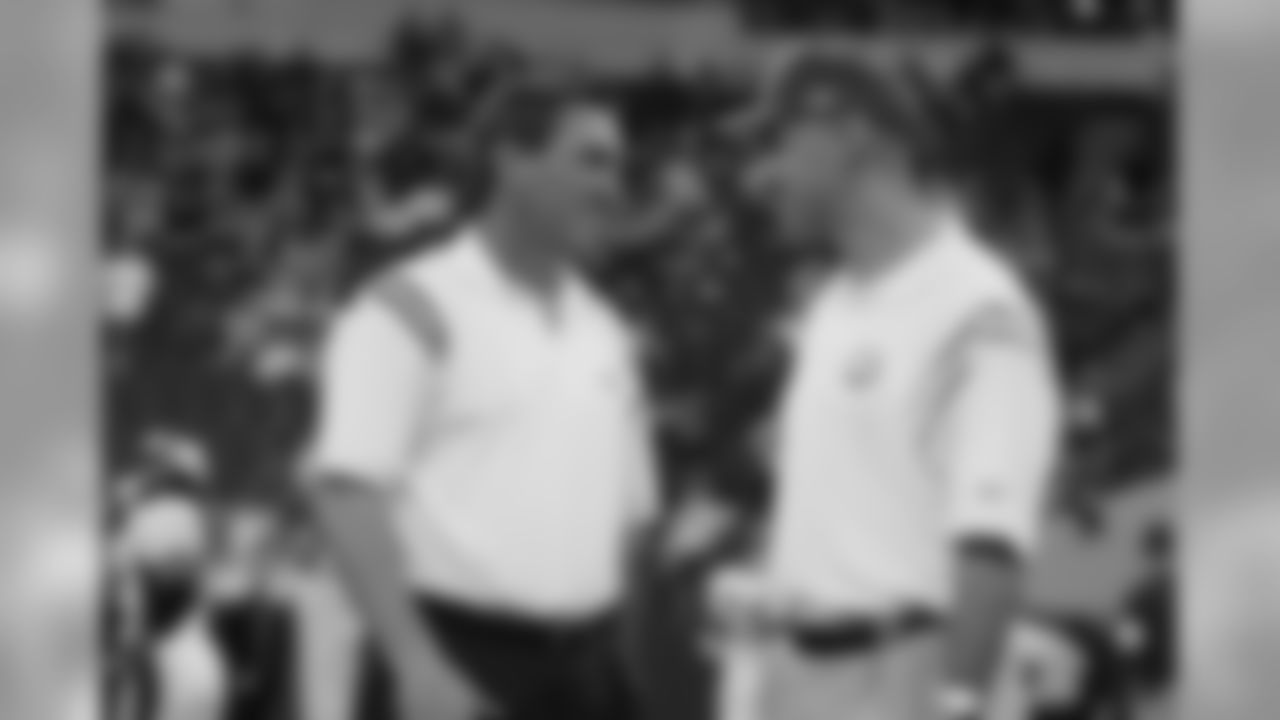
Mike Shanahan chats with Tony Dungy before the start of a Broncos game against the Indianapolis Colts at RCA Dome in Indianapolis, IN on January 4, 2004.

Mike Shanahan made a visit to Eaglecrest High School in Centennial, CO. to present a check to the school for being voted the Staples Coach of the Week.

The Denver Broncos held a special press conference at their Dove Valley facility to announce the retirement of Ed McCaffrey, pictured here shaking hands with head coach Mike Shanahan.

Mike Shanahan greets John Lynch shortly before the press conference introducing Lynch as a new Bronco.

Mike Shanahan was on hand at McGlone Elementary School to conduct a press conference and take a tour of the new playground under construction.

Mike Shanahan jokingly hops onto a motorcycle that was autographed by several players for an auction.

Mike Shanahan was on hand at McGlone Elementary School to conduct a press conference and take a tour of the new playground under construction.

Mike Shanahan watches the players go through their pregame drills before the NFL game against the San Diego Chargers on September 26, 2004 at Invesco Field at Mile High in Denver, Colorado.
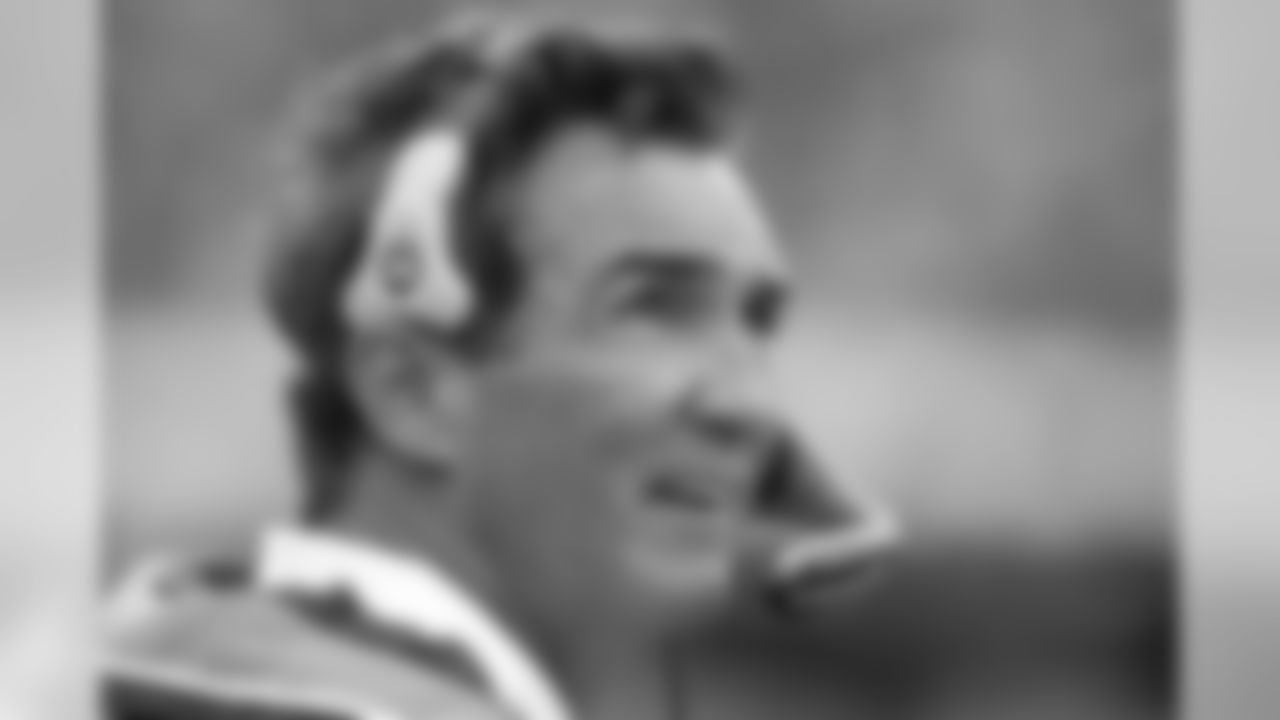
Mike Shanahan watches the game action from the sidelines during the NFL game against the Oakland Raiders on October 17, 2004 at Network Associates Coliseum in Oakland, California.

Mike Shanahan and John Fox chat during the pregame drills before the NFL game against the Carolina Panthers on October 10, 2004 at Invesco Field at Mile High in Denver, Colorado.

Jake Plummer and Mike Shanahan discuss a strategy along the sidelines during a 2004 game against the Raiders. Photo: Ryan McKee/Rich Clarkson and Associates

Mike Shanahan watches his players during their pregame drills before a 2005 game against the Colts. Photo: Ryan McKee/Rich Clarkson and Associates

Mike Shanahan watches the game action from the sidelines during a 2005 game.
Photo: Ryan McKee/Rich Clarkson and Associates

Mike Shanahan chats with Steve Atwater before the Pro Football Hall of Fame enshrinement ceremony for John Elway and the Class of 2004

Mike Shanahan hands out game balls after the Broncos' victory during the NFL game against the Oakland Raiders on October 17, 2004 at Network Associates Coliseum in Oakland, California.

Mike Shanahan discusses a strategy with his players along the bench area during a 2004 game against the Falcons at Invesco Field at Mile High in Denver, CO. ©Brett Wilhelm/Rich Clarkson and Associates, LLC

Mike Shanahan watches game action as snow falls during a 2004 game against the Raiders. Photo: Ryan McKee/Rich Clarkson and Associates

Mike Shanahan looks out on the field during game action against the Raiders in 2004.

Mike Shanahan goes over the game plan with Jeb Putzier during the NFL game against the Tennessee Titans on December 25, 2004 at The Coliseum in Nashville, Tennessee.

Mike Shanahan and his players say a prayer following a 2005 game against the Indianapolis Colts on January 2, 2005 at Invesco Field at Mile High in Denver, Colorado.

Mike Shanahan is presented with a game ball after his 100th Broncos coaching victory during the NFL game against the Tennessee Titans on December 25, 2004 at The Coliseum in Nashville, Tennessee.

Mike Shanahan speaks to the team after a 2005 victory over the Chargers.
Photo: Eric Lars Bakke/Rich Clarkson and Associates

Mike Shanahan patrols the sideline during a 2005 win over the Jacksonville Jaguars at ALLTEL Stadium in Jacksonville, FL.
Photo: Jamie Schwaberow/Rich Clarkson and Associates

Mike Shanahan greets Bill Belichick after a 2005 game against the Patriots. Jamie Schwaberow/Rich Clarkson and Associates

Mike Shanahan poses with Jake Plummer as the Denver Broncos hold their awards banquet for the 2005 Walter Payton Man of the Year at Morton's Steakhouse. Jamie Schwaberow/Rich Clarkson and Associates

Mike Shanahan holds up a decorative game ball commemorating the win that made him the franchise's all-time winningest coach.
Photo: Eric Lars Bakke/Rich Clarkson and Associates

Pat Bowlen talks with Mike Shanahan in the locker room after the Broncos beat the Patriots at Invesco Field at Mile High in Denver, CO in the playoffs. Jamie Schwaberow/Rich Clarkson and Associates

Terrell Davis talks with Mike Shanahan on the sideline before the 2005 AFC Championship Game.
Photo: Ryan McKee/Rich Clarkson and Associates

Mike Shanahan looks on from the sideline before the 2005 AFC Championship at Invesco Field at Mile High Stadium in Denver, CO.
Photo: Ryan McKee/Rich Clarkson and Associates

Denver Broncos head coach Mike Shanahan of the American Football Conference AFC All-Stars surveys the field during the game against the NFC at the NFL Pro Bowl on February 12, 2006 in Honolulu, Hawaii. (AP Photo/Paul Spinelli)

Denver Broncos head coach Mike Shanahan passes the ball as he waits for the start of the team's first football practice after a bye week in Denver on Monday, Oct. 2, 2006. (AP Photo/David Zalubowski)

Mike Shanahan coaches from the sidelines during a 2006 game against the Colts at Invesco Field at Mile High Stadium in Denver, CO. Photo: Rich Clarkson/Rich Clarkson and Associates, LLC

Mike Shanahan talks to the team after a 2006 game against the Raiders.
Photo: Trevor Brown, Jr./Rich Clarkson & Associates, LLC

Mike Shanahan talks with Texans head coach Gary Kubiak, who was Shanahan's longtime offensive coordinator, after a preseason match up at Invesco Field in Denver, CO in 2006. Photo: Ryan McKee/Rich Clarkson and Associates, LLC.

Mike Shanahan prepares to lead the team onto the field before a game against the Raiders.
Photo: Trevor Brown, Jr./Rich Clarkson & Associates, LLC
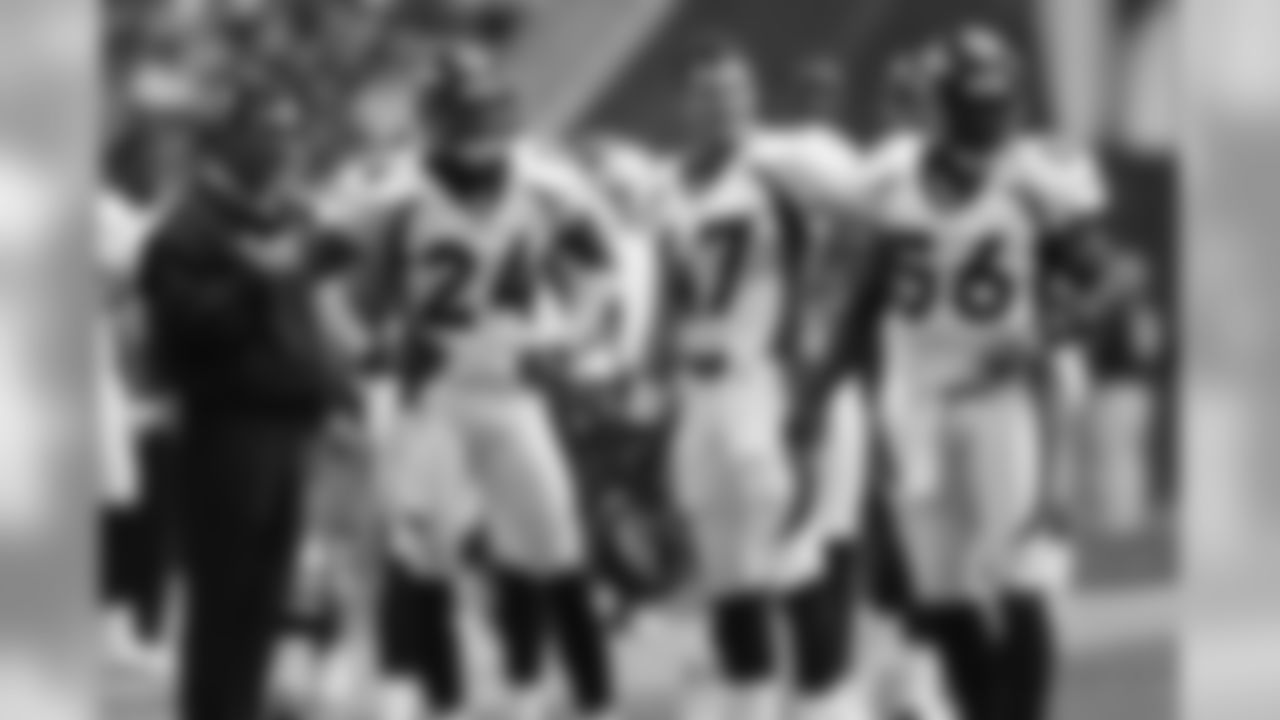
Mike Shanahan talks defensive leaders Champ Bailey, John Lynch and Al Wilson during a 2006 game against the Cardinals.
Photo: Eric Lars Bakke/Rich Clarkson and Associates, LLC.

Mike Shanahan greets cornerback Champ Bailey before a 2006 game against the Chargers.
Photo: Trevor Brown, Jr./Rich Clarkson & Associates, LLC.

Denver Broncos head coach Mike Shanahan, center, is flanked by the director of player personnel Jim Goodman, left, and Ted Sundquist, right, in the team's draft room at the their headquarters in Denver, Colo., on Saturday, April 28, 2007, as the National Football League's annual draft began. (AP Photo/Ed Andrieski)

Head coaches Herm Edwards of the Kansas City Chiefs speaks with Mike Shanahan of the Denver Broncos on November 11, 2007 in Kansas City, Missouri. Denver defeated Kansas City 27-11. (AP Photo/G. Newman Lowrance)

Members of the 1997 Denver Broncos Super Bowl Team gather with Head Coach Mike Shanahan during Terrell Davis' Ring of Fame ceremony at Invesco Field September 21, 2007.

Coach Mike Shanahan addresses his team in the locker room after Denver defeated Atlanta on November 16, 2008 at the Georgia Dome.

Mike Shanahan talks with Jeremy Bates and Jay Cutler as he tries to redirect the offense in the second half against the Carolina Panthers at Bank of America Stadium December 12, 2008

Head coach Mike Shanahan gave a game ball to Marquand Manuel for his galant play during a week of family strife after the team defeated the San Diego Chargers at Invesco Field September 14, 2008

Denver Broncos coach Mike Shanahan looks over possible picks as the Broncos prepare for the NFL football draft, in Denver on Saturday, April 26, 2008. The Broncos have the 12th pick in the first round of the draft. (AP Photo/David Zalubowski)















